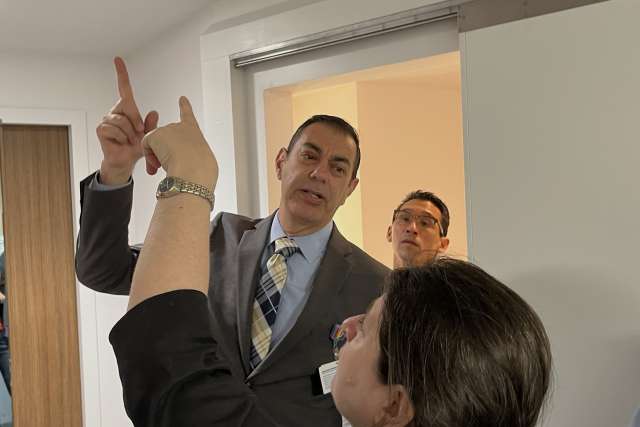Mid-Wilshire
State-of-the-art behavioral health campus coming in 2026
UCLA Health is transforming a former community medical center into a world-class neuropsychiatric hospital in the Mid-Wilshire neighborhood about six miles east of the university’s Los Angeles campus in Westwood. It will include comprehensive behavioral health care services for adult, geriatric, pediatric, and adolescent patients, as well as a dedicated area for crisis stabilization services.
The new UCLA Health hospital will relocate and expand the Stewart and Lynda Resnick Neuropsychiatric Hospital at UCLA.
Enhancements to an adjacent medical office building and parking structure will create a modern, integrated behavioral health campus with a full range of inpatient and outpatient services.
Read more: UCLA Health’s new neuropsychiatric hospital marks major construction milestone.

Address
5900 West Olympic Blvd.
Los Angeles, California 90036
Phone
Photo Gallery

Project Timeline

Latest News
Community benefits
- UCLA Health is one of the few remaining providers of inpatient behavioral health care in Los Angeles County.
- Demand for inpatient psychiatric beds has long exceeded capacity, and the need is urgent. The region has far fewer inpatient psychiatric beds per capita than the recommended public health standard.
- The current Stewart and Lynda Resnick Neuropsychiatric Hospital at UCLA, on the University’s campus in Westwood, routinely operates at capacity.
- The new hospital is planned for 119 inpatient acute care psychiatric beds. That’s 45 (61%) more than the 74 beds in UCLA Health’s current neuropsychiatric hospital. It also will include a dedicated care area for crisis stabilization services.


Environmental benefits
-
The new neuropsychiatric hospital will be an all-electric building. It will meet or exceed University of California standards for environmentally sustainable practices for building materials, energy and water use, waste management, and reduction of fossil fuels use.
-
Plans call for low-flow plumbing fixtures and showers, retention of rainwater runoff, high-efficiency heating, ventilation and air-conditioning equipment, and use of low-carbon and renewable building materials.
- The new UCLA Health hospital and larger behavioral health campus will be targeted to achieve a Gold rating for Leadership in Energy and Environmental Design (LEED).






